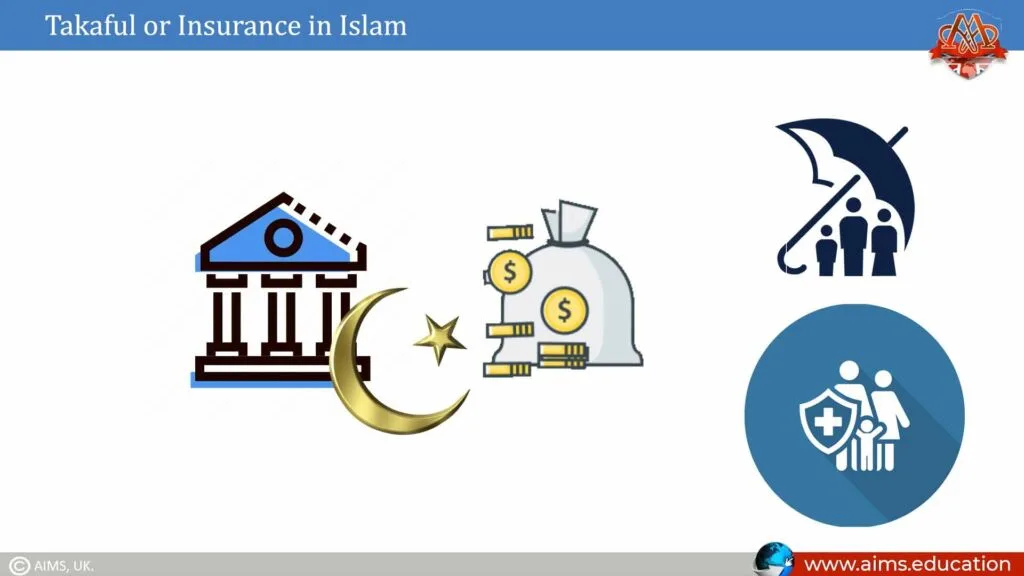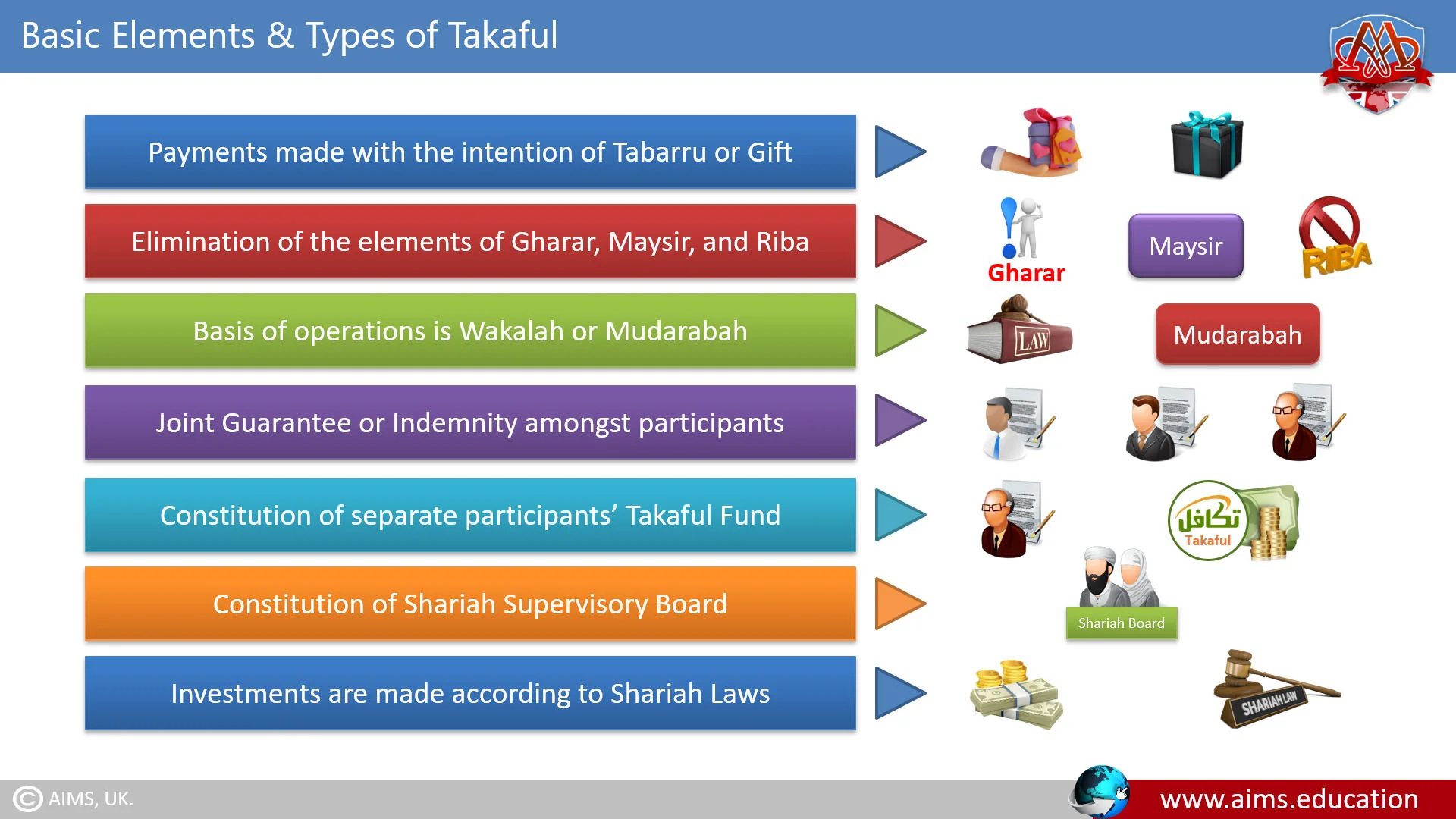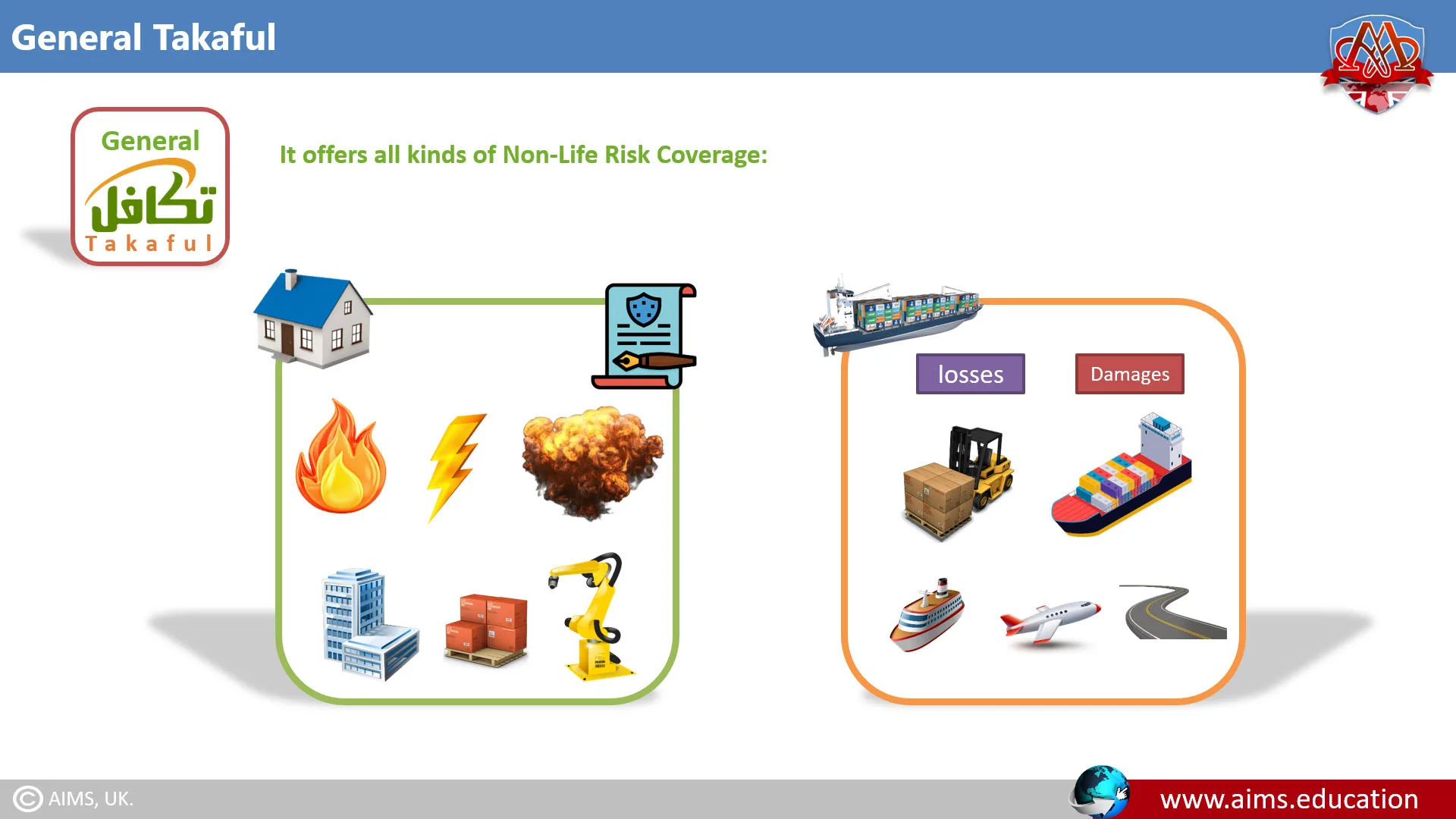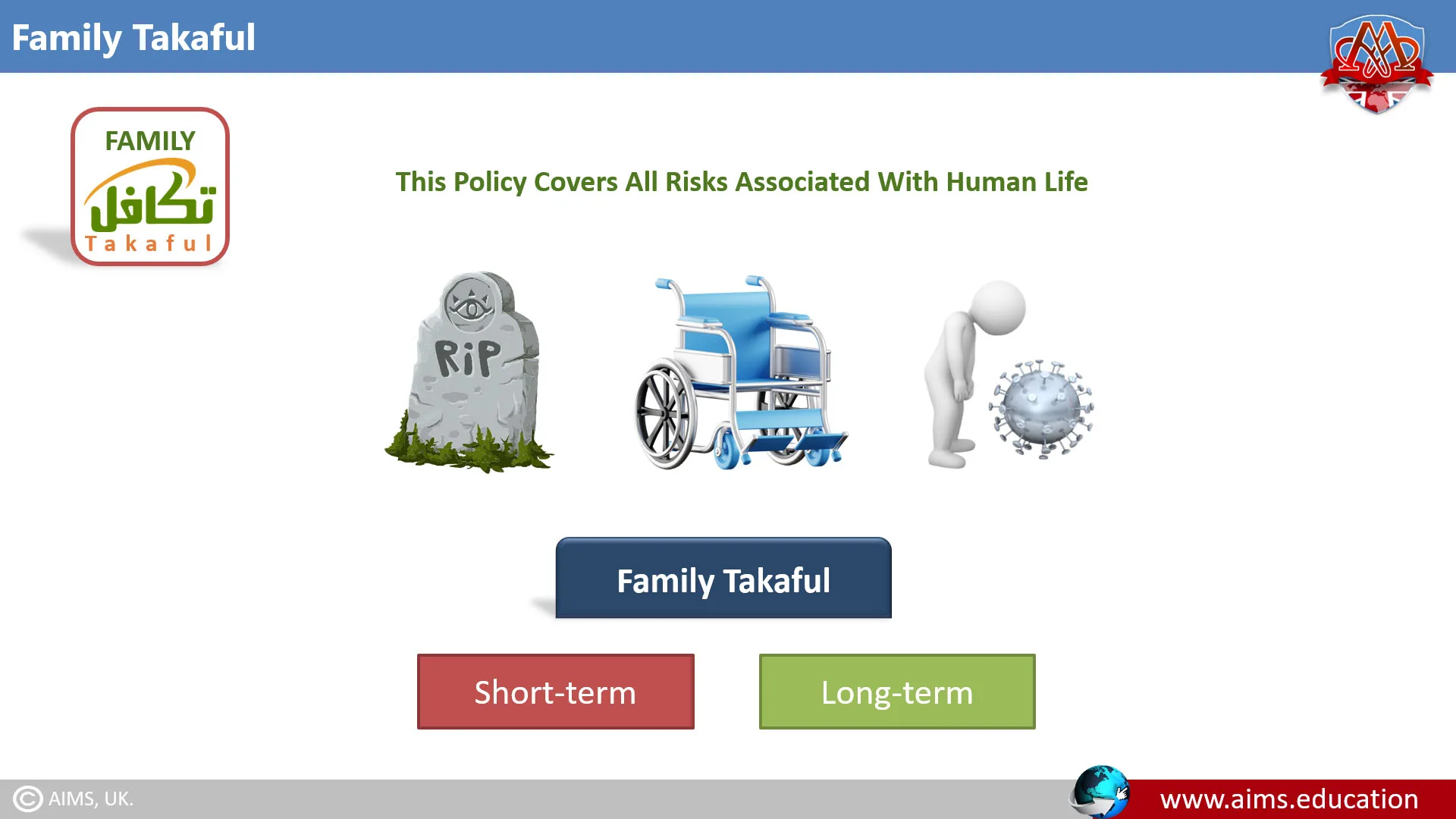Takaful Meaning
The word Takaful or “التكافل” comes from the Arabic root word “kafalah”, which means “Mutual Guarantee” and “Joint Responsibility”. Takaful Insurance is a mutual risk transfer arrangement in which money is pooled and invested, and the members share the profit and loss equally. It has two main types: General Takaful and Family Takaful. It is also known as Islamic Insurance because it is a Shariah-compliant alternative to conventional insurance, which protects against loss or damage to people and their property.
What is Takaful & its Principles?
Its’ main ideology is to bear another person’s burden. Some of its’ important principles are as follows:
- For the common good, the policyholders will cooperate.
- The contribution of the policyholders is considered donations.
- To help those who need assistance, all their policyholders will pay their share.
- The liabilities are shared according to the pooling system of the community and losses are divided.
- According to compensation and subscription, there is no uncertainty.
1. What is the Operating Principle of Islamic Insurance?
Here are the key principles:
- The policyholders will cooperate for the common good.
- The contributions of the policyholders are considered a donation.
- Help those who need assistance, and all the policyholders will pay their share.
- Liabilities, profits, and losses are shared or divided as per the Takaful system.
2. Forbidden Elements in Islamic Insurance
In alignment with Islamic principles, Takaful strictly forbids the following elements, which are common in conventional insurance:
3. How Does Takaful Insurance Work?
Step 1: Agreement
Participants agree to contribute a certain sum of money to a common pool.
Step 2: Contributions for Funds
Each participant makes a regular (usually monthly) contribution to the pool based on the principle of Tabarru’ (donation). These contributions are added to the “Takaful Fund”.
Step 3: Management of Funds
The fund is managed and administered by an Islamic Insurance operator, and they charge a fee for their services. The operator is also responsible to pay the claims and maintain the التكافل fund.
Step 4: Paying Claims
In case of a loss, the operator pays the claim from the halal fund. The claim is usually equivalent to the participant’s loss or the policy’s limit (whichever is low).
Step 5: Profit and Loss Sharing
At the end of a defined period, the surplus funds are shared among the participants and the operator on an agreed ratio.
Step 6: Retakaful
General Takaful operators are usually engaged in Retakaful operations. In Retakful, the operator distributes its risks by investing part of its funds with Retakaful operators.

4. Takaful VS Conventional Insurance:
| Islamic Insurance | Conventional Insurance |
| Islamic insurance is a relationship in which everything is shared. | Conventional insurance is a contract between two parties. |
| Earning profits is not the major purpose of the Islamic Insurance concept. | Everything is planned according to the profit that each party will earn. |
| Both parties equally divide the burden. | In conventional insurance, one party will take the risks for the other. |
| In Islamic Insurance, every procedure is guaranteed. | There is no guarantee that you will get help when required. |
| التكافل is based on the principles of Sharia or Muslim law. | It follows the rules formulated to keep profit in mind. |
| The number of policies that you have to buy for protection is usually lesser. | This is not the case with conventional insurance. |
| It will cover you for every major and minor loss. | In conventional insurance, you will be covered for certain emergencies. |
You may also learn about the key differences between conventional banking and Islamic banking.
5. Examples of Takaful
1. MOTOR VEHICLE
A group of individual car owners contribute a certain amount of money to a common fund managed, on a Shariah Compliant risk sharing model. If one of the participants faces an accident, the التكافل fund would cover the damages.
2. DEATH
Suppose a person is a sole earner in his family, and he participates in a Family Takaful plan. If he passes away or is disabled, the التكافل scheme would provide a sum of money to his family. This money is not a profit of his contribution.

“Since 622 AD the concept of has been practiced in different forms. The foundation of the insurance in Islam was laid with the help of sharing the responsibilities between the Muslims. In 1976 a Fatwa was issued by the Higher Islamic Council of Saudi Arabia that Takaful is legitimate as compared to the conventional insurance. Since then considering the Islamic values the rules and regulation for the Takaful have been formulated. Based on this concept in 2008 the Islamic industry grew from $1.3384 billion to $3.318 trillion. There are more than 1,000 companies that are working on these rules, globally.”
Historical Backgroud of Takaful!

Takaful Models
1. Mudharabah Model
The Mudharabah model involves a profit-sharing agreement between participants and the operator. The operator receives a predetermined share of profits and participants bear the losses.
2. Wakalah Model
The Wakalah model is agency-based. The operator manages investments and claims and they receive a fixed fee from the takaful fund.
3. Musharakah Model
It is based on the principles of Shirkah and Shariah Compliant Risk Sharing Principles. In the Musharakah model, all parties contribute capital and share profits and losses.
Rising Global Interest in Islamic Insurance
As the acceptance of Islamic finance principles is growing, more individuals and institutions are gravitating towards التكافل. Islamic banking and Insurance qualification has also seen a surge, with an increasing number of students participating and developing their expertise in Islamic Finance and Insurance. There is a visual demand for professionals who are willing to develop their expertise through AIMS’ online Islamic economics and finance PhD and affordable MBA in degree in Islamic banking and insurance to work in top-tier IFIs.

Types of Takaful
There are many unique features of the Shariah Complaint Insurance, that the owners of the policy will enjoy. It provides coverage according to Islamic rules and regulations. There will be no interest rate and the owner will surely get the benefits he has applied for. There are two basic types of takaful, and they are general takaful and family Takaful.
1. General Takaful
General Islamic Insurance plans are intended to meet the insurance needs of people and corporate bodies in connection to materialistic loss or damage done due to any catastrophic condition.
General Takaful Concept
In General Takaful, participants pay their premiums into the Takaful store as a Tabarru’. This will wipe out the components of al Gharar and bet. That is, the member consents to give their premium to the reserve with a mission to help different members secure under the different Takaful plans, when in trouble. In this way, the individuals convey the hazard and the Takaful administrator is just an overseer. Musharakah, Mudharabah, and Wakalah models can be actualized under this approach. For the most part, all the physical properties and resources, like homes, cars, and buildings.
General Takaful Products
The measure of commitment to be paid by any members who take an interest in any of the assortment of plans of General Islamic Insurance relies upon and corresponds to the fitting rates and the estimation of properties being secured. The benefit-sharing proportion will be made known to the members in advance and concurred by the two gatherings.
General Takaful offers all kinds of non-life risk coverage, and it is divided into the following classes:
a. Property
This policy provides compensation in the event of damage to the property caused by fire, lightning, and explosion. It applies to buildings, stock, machinery, and similar contents.
b. Marine
It compensates losses or damages to cargo or freight on Vessels, Aircraft, or roads.
c. Motor
It applies to damage to the vehicle incurred as a result of any accident.
d. Miscellaneous General
This coverage is personalized and tailor-made to corporate requirements.

2. Family Takaful
Family Takaful is a contract of Taburru where the non-zakat gift is made in customary interims to the Waqf Fund by the members. Under this concept, all dangers related to human life are secured like demise, handicap, and ailment including here and now and long-haul speculation needs.
The scope of Islamic Insurance items offered falls into two classifications:
- Hazard items that are accommodated the security of the members.
- Speculation items with a component of hazard.
Concept of Family Takaful
These items tend to be normal reserve funds designs where a member demonstrates his need to accomplish an objective singular amount by a predetermined time later on. Under this plan, the members pay their premiums into the Takaful store. A bit of the premium is allotted only for funds and venture, and the adjustment goes as a Tabarru to develop saves as claims hold, unmerited premium saves, and much more, to coordinate costs, and to pay for Retakaful or reinsurance.
This policy covers all risks associated with human life such as death, disability, and illness; through short-term and long-term investment needs.
Types of Family Takaful Plans
a. Term Life
If the life assured dies within a specified period, it provides payment of the sum assured only.
b. Whole Life
This contract theoretically covers the insured and a level premium is payable for life.
c. Endowment
It provides endowment benefits at retirement. Or, in case of an earlier death of the insuree, they are paid to the dependents.
d. Universal
It provides lifetime financial security, with the flexibility to the changing needs and aspirations of the insuree.
e. Marriage Plan
It is designed to fulfill parents’ needs for their children’s marriage.
f. Education Plan:
It especially caters to a child’s future financial needs for education.
Once more, Mudharabah, Wakalah, and Musharakah models can be executed under this approach. Here you may find details of these terms through our Islamic banking glossary. Past these two primary regions, Islamic insurance items are additionally accessible for well-being and benefits needs. It ought to be noted that this protection system isn’t only for Muslims yet in addition for non-Muslims, as it is observed by them as a moral type of protection. A detailed study of Islamic Insurance/takaful is a part of AIMS’ CIFE program.
Frequently Asked Questions
Q1: What is Takaful and how is it different from conventional insurance?
Takaful (Islamic insurance) is a mutual risk-sharing system funded by donations (Tabarru’). It avoids Riba, Gharar, and Maysir, and may share surpluses with participants—unlike conventional insurance’s profit-driven, interest-based contracts.
Q2: What are the core principles behind Takaful?
Cooperation for the common good, Tabarru’ of contributions, and sharing of liabilities, profits, and losses. Operations must be Shariah-compliant with transparent handling of contributions, claims, fees, and surpluses.
Q3: How does a Takaful policy work from contribution to claim?
Participants contribute regularly to a pooled fund. A Takaful operator manages underwriting and claims, pays valid claims from the fund, and distributes any surplus per the agreed model. Retakaful may be used to spread risk.
Q4: What are the main Takaful models used by operators?
Mudharabah (profit-sharing), Wakalah (agency with a fee), and Musharakah (joint venture). Jurisdictions may adopt hybrids, but each model must remain Shariah-compliant and disclose fees and sharing rules.
Q5: What is the difference between General Takaful and Family Takaful?
General Takaful covers non-life risks (property, motor, marine, miscellaneous). Family Takaful covers life-related risks (death, disability, illness) and can include savings or investment components.
Q6: Which elements are prohibited in Takaful operations?
Riba (interest), Gharar (excessive uncertainty), and Maysir (gambling). Products and investments must avoid non-compliant sectors and ambiguous terms.
Q7: Can you share simple examples of Takaful in practice?
Motor Takaful covers collision losses from a shared pool; Family Takaful supports dependants after a participant’s death or disability. Both rely on donations and shared responsibility.
Q8: What is Retakaful and why is it used?
Retakaful lets operators transfer part of their risk to another Shariah-compliant pool, enhancing capacity for large or catastrophic losses while maintaining Islamic principles.
Q9: How are surpluses treated in Takaful funds?
After claims and expenses, any surplus may be distributed to participants—and possibly the operator—per the model’s rules (e.g., Mudharabah share or Wakalah performance fee).
Q10: Who can participate in Takaful—only Muslims?
Anyone can participate. Many non-Muslims choose Takaful for its ethical screening, transparency, and cooperative nature. Availability depends on local regulations and operator offerings.
